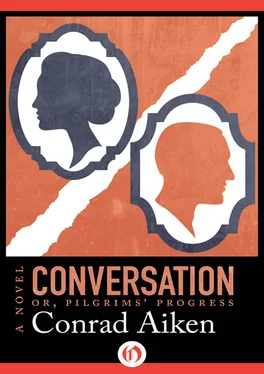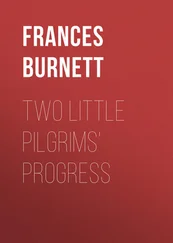“I see — and you complain about lack of co-operation! You intend simply to dictate, is that it?”
“In matters vital to me, I certainly do. I’ve learned my lesson.”
“And what about me? What about the things that are vital to me?”
“Well — what, for instance?”
“Well — love, for instance.”
“Love! What do you know about love!”
“And what exactly do you mean by that?”
“It was a flat enough question, wasn’t it? What do you know about love? Can you love? Have you ever really loved me for a minute? I very much doubt it. If you had, how could you possibly have done all these things to me!”
“So you think I don’t love you.”
“Well — do you?”
“I think I’ll leave that to you. You seem to know everything, don’t you? So perhaps you’ll tell me.”
“Well, I think I will. I think perhaps for once I will.”
“Do.”
“And it goes for all of you — the whole New Bedford and Boston lot of you — the whole cold-smoked egotistical lot of you. There’s really something wrong with you, you New England women — something esthetically wrong with you, something wrong with the pulse, you’re not quite human. And it was summed up, I think, quite well, by a Greenwich Village poet who evidently knew what he was talking about. He said: ‘ I have eaten apple pie for breakfast in the New England of your sensuality.’”
“ Oh !”
“Yes. Very pretty, isn’t it?”
“That’s the cruelest thing—”
“ Cruel —!”
She spun suddenly on her heels, turning her back, flashing a hand towards her face, but not before he had seen the quick tears starting, the lovely mouth quivering and arched with pain. Her shoulders were trembling, she was biting the back of her hand and trembling, but she hadn’t made a sound — and then (as suddenly as she had turned away) she turned back again, went quickly, blindly, past him into the hall, and across it and into the bathroom. He heard the door close, heard the sound of running water — she had turned the taps on, to drown out the sound of her crying. She was standing there crying — and as he waited irresolute, half wanting to listen and half not — for he had never heard Ee really crying before — it seemed to him that something very queer and profound had happened to him in that instant when she had turned away, with the tears starting on to the back of her hand, on to her rings, and her mouth taking that extraordinary shape of unhappiness. For one thing, her mouth, in that moment, had seemed to him more beautiful than it had ever seemed before — as if, suddenly, it had taken on a new and deeper meaning. All of her, in fact, had changed startlingly in that instant. She had become tragically different, a separate and unknown, an unhappy and perhaps somehow doomed , person — and a person, moreover, who might already have resumed her liberty of action! What would happen to her — what wouldn’t happen to her — what would become of her? Shapes of disaster, misery, death — the feeling of catastrophe again — but now immediate and dreadful: and himself perhaps powerless and exiled. The distance between them had become immense; and yet at the same time it seemed to him that he had never before seen her so clearly. He remembered thinking of her as a ship’s figurehead, borne backward away from him by her own will — but that had been nothing, that had been a mere pretense — this was real. It was as if she had gone.
But had she resumed her liberty of action?
Was that what it meant?
Had he at last hurt her too much? Hurt her so much that now there would be no going back — no bridging of the gulf that had fallen between them?
He stood still and listened. He stepped softly into the hall and listened. He could hear nothing — nothing but the sound of the running water in the basin. That and the rain — and then a car rumbling over the loose boards of the bridge, coming nearer, its Klaxon skirling angrily as it shot up the road into the village. And then the silence again, for the gentle persistent sound of the rain, the sound of running water.
He went back into the studio, walked twice round it, circling the wicker chair, avoiding the tripod legs of the easel — paused to press back the front log in the fire with his shoe — then pulled one of the window curtains aside and looked out at the street. Nobody — nothing — it was deserted: nothing but the sad autumnal rain, the rain which would probably last all night and all day. The Rileys’ house was dark — but, of course, Mr. Riley had turned in early, tomorrow was a fishing day, he would be down at the Town Landing, with his bait boxes, at four in the morning. Going down the river in the rain, the dirty blue boat stuttering loudly past the sleeping houses, past the moored yachts at the lower village; and then down the channel, past the breakwater and the bell buoy, to the Sound, the open sea, a mile of lobster pots along the sandy shore. How simple, how good, how solid — how reassuring, if life were always as well arranged as that! Yet he had been a friend, hadn’t he, of Miss Twitchell — Miss Twitchell had often called there with her basket of flowers, standing there on the porch, Mrs. Riley’s white, sharp, New England face peering around the half-opened door, the door which she always held tightly clutched in her hands — he and his wife had been her friends, but what good had that done her? She had lain for two days in Indian Pond without their even knowing it.…
He let the curtain fall back into place, opened the door to the little front hall, with its wooden hat pegs on the white paneling, and there on the floor, as he had foreseen, was the pink cart. A doll, too, squatted against the wall, its china arms upraised, the dead blue eyes half-closed, and a level fringe of brown hair showing under the bonnet’s edge. “ Just a little pink cart” —Jim Connor had said: the typical, the eternal, pink cart of childhood, with the yellow tongue, the bands of silvery metal round the wheels, and the crude bright floral design on the hubs. How she would love it — how she would love the doll, too, and take it for rides round the garden — and how good of Jim! How good of him to think of it, and do it, in the middle of his own troubles — to go to a shop and find these things! A Messiah, as Kitty had said? Perhaps not. But there were times when he was very like.
He picked them up, and carried them slowly through the studio into the hall, where he put them down on the window seat. It was odd — but it seemed to him, for some reason, that he was noticing everything, every detail. As he passed through the studio it was as if he enumerated each thing that he saw. The wood basket, of pale woven wood, and a pine log with silver moss on it; the brass Cape Cod firelighter on the brick hearth, with a splayed red reflection of the lampshade down its side; the black iron rosettes, like black pond lilies, of the firedogs; a wavering comb of flame, fine-toothed and golden, just beginning to play up, and retreat, between the uppermost logs of the fire; and Karl’s little etching in the corner — his first — of a Mexican adobe hut, round-doored, in snow-bright moonlight: he had observed each of these things in turn, and subtly as if out of some deep necessity or purpose. Or perhaps simply to be reassured, to be given back his confidence?
But why?
How ridiculous!
Just the same —
In the hall, standing by the stove again — the stove in which perhaps he ought to lay a fire — he listened, swaying slightly in his effort to remain still. He heard nothing, nothing beyond the running of the water — and then it seemed to him wrong to listen, or only to listen — wrong to be there in secret , listening — so he went hesitantly into the dark dining room, and down into the kitchen, and back into the dining room again. He struck a match and relighted the candle on the piano top — for it would be absurd to be found just standing there in the dark, doing nothing — and looked up once more at Famous Place to See Moon; but this time without seeing it.
Читать дальше












